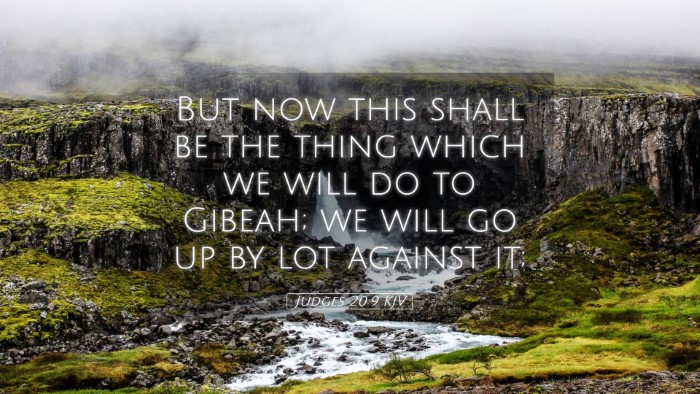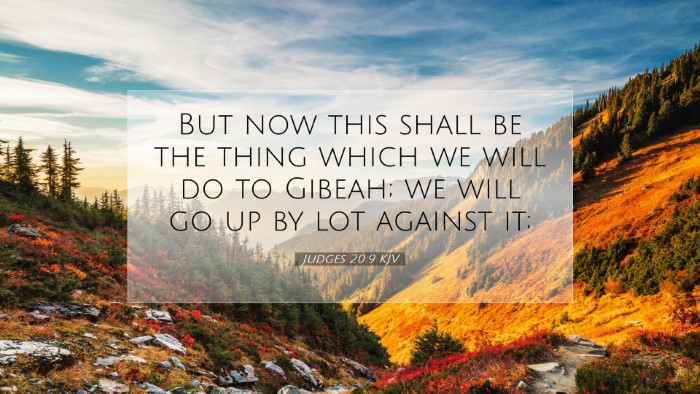Commentary on Judges 20:9
Verse: "But this is what we will do to Gibeah; we will go up against it as the lot directs." (Judges 20:9, NIV)
Introduction
The book of Judges depicts a tumultuous era in Israel's history where the people often turned away from God. In Judges 20, we encounter the aftermath of a grievous sin committed by the tribe of Benjamin, leading to a civil conflict among the tribes of Israel. This verse reflects the resolve of the Israelites to act against Gibeah, the site of the transgression, through divine guidance.
Contextual Background
Understanding the context of this verse is crucial. The incident in Gibeah, where a Levite's concubine was abused and ultimately died, incited outrage among the Israelites. The Levite's call to action brought the tribes together to seek justice against the wickedness of Gibeah. This verse illustrates the determination of the Israelites to respond to this atrocity with divine strategy, emphasizing the need for unity and purpose in their ethical stance.
Theological Insights
- Divine Revelation: Matthew Henry emphasizes that the lot served as a means of divine revelation in guiding the people. This practice indicated their dependence on God for direction in times of crisis.
- Collective Responsibility: Albert Barnes notes the importance of communal responsibility and the collective moral duty of the Israelites. Their united approach underscored the significance of addressing communal sin.
- Righteous Judgment: Adam Clarke highlights that the judgment against Gibeah was not merely a punitive measure, but a righteous response to the horrifying act against a vulnerable individual. Clarke also implies that the justice sought was part of a broader theme of divine retribution in Israel's history.
Key Themes
- Justice and Retribution: The pursuit of justice is central to this narrative. The lot signifies that their endeavor is not out of vengeance but out of a need to restore righteousness within the nation. Understanding this intent is vital for theologians studying the nature of justice in the Old Testament.
- The Role of Divine Providence: The act of casting lots signifies a deeper reliance on God’s providence. The Israelites recognized their limitations and sought God’s guidance in executing justice.
- Unity in Adversity: This passage exemplifies the unifying nature of a common cause in adversity, serving as a reminder of the need for communal integrity among believers when faced with societal issues.
Application for Today
For modern pastors and theologians, Judges 20:9 is a powerful commentary on the necessity of divine direction in our pursuits of justice. Today's leaders should be mindful of how communal sin can lead to national consequences. The Israelites did not take lightly the need for deliberation in their actions, raising important ethical questions relevant to contemporary society.
Moreover, the need for collective action against evil resonates with present-day issues where communities face moral crises. The emphasis on unity among the tribes serves as a call for the church to come together in addressing injustices in a way that reflects God's character and desires.
Conclusion
Judges 20:9 encapsulates a pivotal moment in the narrative of Israel’s history — a moment of reflection, decision, and action. The combined insights from Matthew Henry, Albert Barnes, and Adam Clarke provide a rich tapestry of understanding, guiding current and future leaders as they navigate the complexities of faith and communal ethics.
Ultimately, this passage challenges us to seek divine guidance in our collective decision-making and to act justly in the face of wrongdoing. It encourages a deepening of our reliance on God’s wisdom as we pursue righteousness both individually and as a community.


